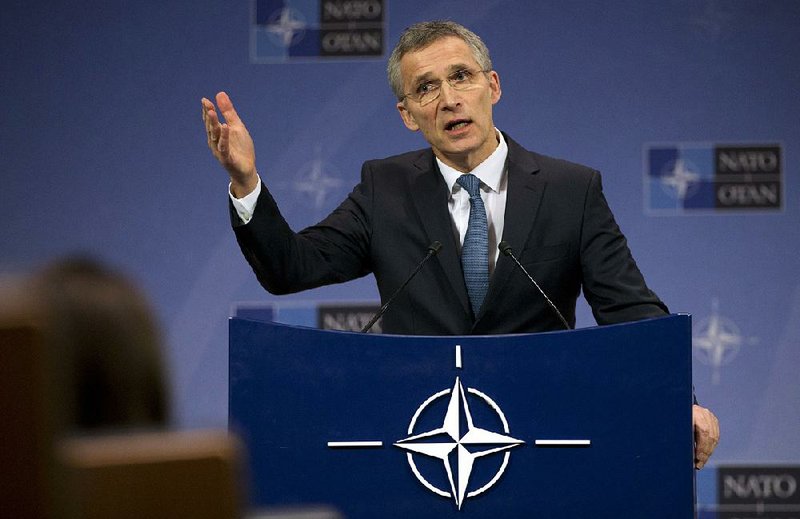BRUSSELS -- The NATO chief urged allies on Tuesday to step up their defense spending, a day ahead of the first meeting between new U.S. Defense Secretary James Mattis and his 27 NATO counterparts in Brussels.
RELATED ARTICLES
http://www.arkansas…">Trump knew Flynn deceit 2 weeks ago http://www.arkansas…">Judge bars Trump travel ban in Virginia http://www.arkansas…">Hold detainees, senators urge http://www.arkansas…">Netanyahu, Trump meet today to feel out positions http://www.arkansas…">Records reported to show Trump allies' Russia contacts http://www.arkansas…">Senate confirms McMahon to lead small-business agency http://www.arkansas…">U.S. sees treaty breach as Russia deploys missile
President Donald Trump suggested during his campaign that he might not defend allies who refuse to contribute their fair share. His comments have alarmed European nations, particularly those near Russia's border, like Poland and the Baltic states of Estonia, Lithuania and Latvia.
"Fair burden-sharing and increased defense spending underpins the trans-Atlantic alliance," NATO Secretary-General Jens Stoltenberg told reporters. "If we reduce defense spending in times when tensions are going down, we have to be able to increase defense spending when tensions are going up, as they are now."
While the Trump administration is weighing its defense commitments to Europe, NATO leaders have already committed to halting spending cuts and raising their military budgets to 2 percent of gross domestic product.
[PRESIDENT TRUMP: Timeline, appointments, executive orders + guide to actions in first 100 days]
But apart from the United States, only four other NATO member countries do so -- the United Kingdom, Estonia, Poland and Greece, according to NATO figures.
Low defense spending is not a new problem for NATO, but it has taken on greater prominence as allies struggle to fathom what Trump might actually demand from them and amid Russia's increasingly aggressive acts.
After the end of the Cold War in 1990, European nations reined in their military budgets, and the 2008 economic crisis only forced further cuts.
Still, concern about the growing shortfall and the damage it was doing to defense research and development was already on NATO's radar a decade ago. Successive NATO chiefs have warned of the dangers of not doing more.
After Russia annexed neighboring Ukraine's Crimean Peninsula in 2014, only years after invading neighboring Georgia in 2008, the writing was on the wall.
In 2014, NATO leaders committed to halt the decline and move within a decade to spend 2 percent of GDP.
"We don't expect all allies to meet the 2 percent immediately, but we expect allies to stop the cuts," Stoltenberg said Tuesday. Indeed, 24 of the 28 allies already have.
The United States is by far NATO's most powerful ally. It spends more on defense than all the others combined; 3.61 percent of GDP in 2016, according to NATO estimates, although U.S. spending too has tapered off in recent years.
Germany spent 1.19 percent of its overall budget on defense last year. Ten countries spend even less and seven -- including Canada, Italy and Spain -- would have to virtually double their spending to reach the target. One, Luxembourg, would require a four-fold increase to get close.
While most have stopped the decline and many are slowly increasing their spending, the 2-percent figure remains contentious. GDP fluctuates in times of boom and bust, and just because a country spends a certain amount, it doesn't mean the money is being spent wisely.
Correct spending levels do not guarantee that adequate forces can be deployed into battle in a timely way and sustained by efficient supply lines, Jan Techau wrote in an analysis for the Carnegie Europe think tank.
Still, Trump's warnings, Russia's assertiveness and extremist attacks in European capitals have galvanized the allies, at least as far as political declarations go. Lithuania's leader says her country, which borders Russia's Kaliningrad and has a large Russian-speaking minority, will meet the target by next year.
A Section on 02/15/2017
